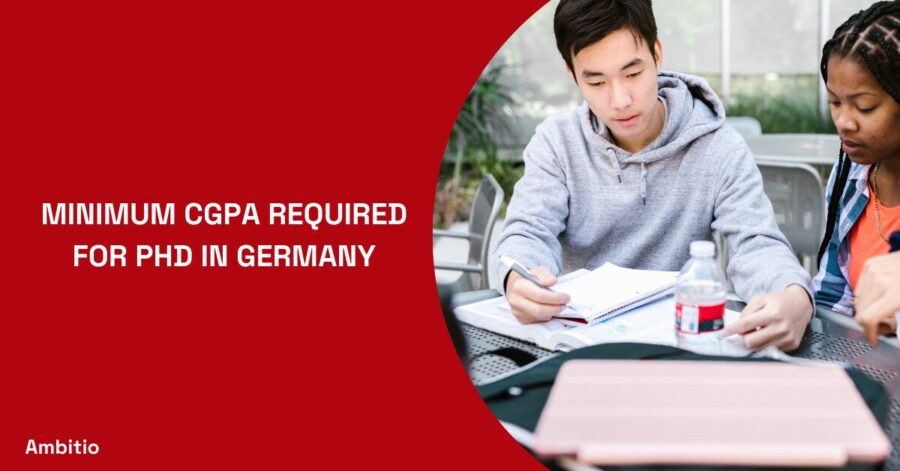14 December 2024
5 minutes read
Minimum CGPA Required for PhD in Germany: A Comprehensive Guide

Introduction
Germany, known for its academic prowess and innovative research fields, continues to attract scholars worldwide. With the increasing number of international students eyeing German universities for their doctoral studies, understanding the nuances of the admission process, including the minimum CGPA required for a PhD in Germany, becomes imperative. This guide aims to offer a holistic view of studying in Germany and the various elements that play into securing admission.
The Significance of CGPA in German Universities
The Cumulative Grade Point Average (CGPA) is more than just a number. It encapsulates a student’s academic journey and is a testament to their dedication and rigor. For German universities, this number often serves as the first filter in the admission process.
The Role of CGPA in International Admissions
For international students, CGPA acts as a standardized measure, giving German universities a glimpse into their academic capabilities. The weightage of CGPA might vary based on the country of origin, given the differences in educational systems and grading methods.
Technical Universities vs. General Universities: Does CGPA Requirement Vary?
Technical universities, like the renowned TU9 group, often have stringent CGPA requirements due to the specialized nature of courses they offer. In contrast, general universities might provide a broader spectrum of disciplines, making them more flexible in their admission criteria.
| Feature | Technical Universities | General Universities |
|---|---|---|
| Nature of Courses Offered | Specialized courses primarily in engineering, technology, and natural sciences. | Broader range covering humanities, arts, social sciences, natural sciences, etc. |
| CGPA Requirement (Typically) | Higher due to the specialized nature. A CGPA closer to the top of the scale is preferred. | Slightly more flexible, with a broader acceptance range. |
| Research Opportunities | Focused on technological advancements, patents, and industry partnerships. | Diverse research areas including arts, culture, and societal studies. |
| Admission Competition | Highly competitive, especially for renowned courses or disciplines. | Varies based on the course, but might be less competitive for certain disciplines compared to technical counterparts. |
| Campus Infrastructure | Equipped with advanced labs, research facilities, and technical tools. | Balanced infrastructure catering to a wide range of disciplines – theaters, art studios, labs, etc. |
| Industry Connections | Strong ties with industries, tech companies, and engineering firms. | Varied connections spanning NGOs, corporates, media houses, and more. |
| Post-Study Opportunities | Jobs in tech firms, R&D roles, consultancy in technology sectors. | Diverse opportunities ranging from academia, media, arts, business, and more. |
| International Collaboration | Partnerships primarily with tech institutes worldwide. | Collaborations with varied global institutions, covering a range of disciplines. |
| Tuition Fees | Might be slightly higher due to specialized equipment and facilities. | Can vary but might be lower for certain disciplines compared to technical courses. |
Understanding the German Grading System
Germany has a unique grading system, usually ranging from 1.0 (very good) to 5.0 (fail). Understanding this is crucial for international students to equate their grades accurately and gauge where they stand.
Beyond CGPA: Other Crucial Elements for Admission
While the CGPA is an essential factor, German universities also weigh in on letters of recommendation, statements of purpose, and practical experiences. They offer a holistic perspective of the candidate, often proving beneficial in close-call decisions.
While a robust CGPA certainly serves as a cornerstone for any application to German universities, it’s just a part of the entire story. Admissions committees seek a holistic understanding of the candidate, aiming to decipher the potential behind the grades. Here, we delve deep into these other pivotal components that play a significant role in the admission process.
1. Statement of Purpose (SOP)
- What is it?
An SOP is a personal essay that provides insights into why a student wishes to pursue a specific course, their aspirations, and what makes them a suitable candidate. - Why is it crucial?
An SOP gives life to the grades and numbers, allowing the admissions panel to connect with the applicant’s journey, passion, and motivations.
2. Letters of Recommendation (LORs)
- What is it?
LORs are endorsements, usually written by professors, mentors, or employers, vouching for the candidate’s capabilities and achievements. - Why is it crucial?
LORs act as third-party validations, highlighting the applicant’s strengths, character, and potential. They provide a perspective beyond academic achievements.
3. Practical Experience and Internships
- What is it?
A record of any relevant work, research, or internships undertaken by the candidate during or after their previous academic programs. - Why is it crucial?
Real-world experience showcases the practical application of knowledge, the candidate’s work ethic, and their exposure to professional environments.
4. Research Proposals (for PhD Candidates)
- What is it?
A detailed document outlining a candidate’s proposed research during their PhD, encompassing the objectives, methodology, and potential implications. - Why is it crucial?
A well-structured research proposal displays the candidate’s clarity of thought, depth of research, and readiness for doctoral studies.
5. Extracurricular Achievements
- What is it?
Any non-academic pursuits, including sports, arts, leadership roles, community service, or other hobbies and interests. - Why is it crucial?
They offer a glimpse into the candidate’s personality, showcasing a balanced approach to life, dedication to diverse interests, and the potential to contribute to the university’s community.
6. Language Proficiency
- What is it?
Certificates or scores from recognized language tests like IELTS, TOEFL (for English) or TestDAF, DSH (for German). - Why is it crucial?
To ensure the candidate can comfortably engage with the course content, participate in discussions, and integrate into the academic community.
7. Portfolio (for Design and Arts Programs)
- What is it?
A collection of the candidate’s best work, be it designs, artworks, or other creative endeavors. - Why is it crucial?
It serves as a testament to the candidate’s creativity, originality, and technical proficiency in their field.
The Scholarship Landscape: How CGPA Plays a Role
For many international students, the dream of studying in Germany is often accompanied by the daunting challenge of managing finances. Scholarships emerge as a beacon of hope, assisting students in covering tuition fees, living expenses, and sometimes, additional research costs.
While numerous factors influence scholarship eligibility, CGPA remains an undeniable pillar. Here’s a deep dive into the interplay between CGPA and the scholarship landscape in Germany.
Aiming for Prestigious Institutes: The CGPA Benchmark
For students eyeing institutions like LMU Munich, University of Heidelberg, or TU Berlin, it’s essential to know that these institutions usually have a higher CGPA threshold due to their global acclaim.
Preparing for a Doctoral Study: Steps Beyond CGPA
Once the CGPA meets the criteria, students must also focus on building a strong research proposal, networking with potential supervisors, and understanding the intricacies of the German doctoral system.
Tackling the Language Barrier: Proficiency in German and English
Germany offers numerous courses in English, especially at the postgraduate level. However, for those looking to integrate more closely with the local community or aiming for specific universities, learning German might be beneficial.
Tests and Certifications: Validating Your Language Skills
German universities typically recognize certifications like TestDAF, DSH, Goethe for German proficiency, while English-taught courses might require IELTS, TOEFL, or PTE scores. Achieving high scores can also enhance the overall strength of the application.
The Cultural Immersion: Learning German Beyond Academics
A good grasp of the German language aids in cultural immersion. From day-to-day interactions to understanding the local customs and traditions, language plays an integral role.
Financial Aspects of Studying in Germany: Tuition Fees and Living Costs
Germany is known for its affordable higher education. However, the overall expenditure includes tuition (if applicable), living expenses, insurance, and other miscellaneous costs.
Navigating Scholarships and Financial Aids
Various organizations, including DAAD, offer scholarships to international students. Some scholarships cover tuition, while others also provide a monthly stipend. A good CGPA, combined with a strong application, can significantly increase the chances of securing these scholarships.
Working While Studying: Rules and Opportunities
Germany allows international students to work part-time. This not only aids in covering living expenses but also provides practical experience, which can be invaluable for doctoral students.
Conclusion and Final Thoughts
Embarking on a PhD journey in Germany requires meticulous planning and a thorough understanding of the admission criteria. While CGPA stands as a crucial component, building a holistic profile, understanding the cultural and academic landscape of Germany, and being proactive can lead to a rewarding academic journey in one of the world’s leading education hubs.
FAQs
Q1: Is the CGPA the only eligibility criteria for a PhD in Germany
No, while CGPA is crucial, German universities also consider work experience, research relevance, language proficiency, and more.
Q2: What is the CGPA equivalent for German grading?
A CGPA of 7 or 70% is often equated to the German grade of 2.5. However, this can vary based on universities and specific courses.
Q3: Do all German universities ask for German language proficiency?
Not necessarily. While some programs require students to learn German, many courses, especially at the postgraduate level, offer instruction in English.
Q4: How can I cover the tuition fee for my PhD in Germany?
Many German universities provide scholarships, and some regional institutions might even offer tuition-free education for international students.
Q5: Is work experience necessary to pursue a PhD in Germany?
While it’s not always mandatory, relevant work experience can enhance your application and increase your chances of getting admission.

You can study at top universities worldwide!
Get expert tips and tricks to get into top universities with a free expert session.
Book Your Free 30-Minute Session Now! Book a call now




























